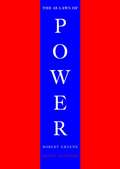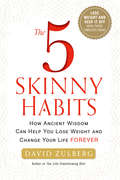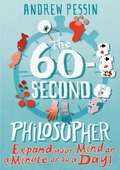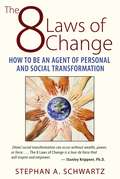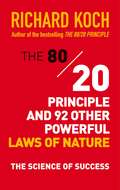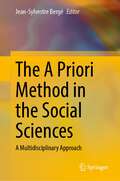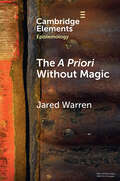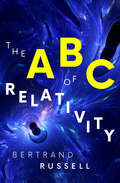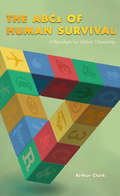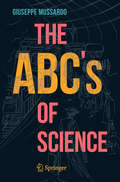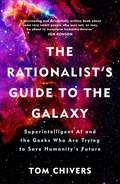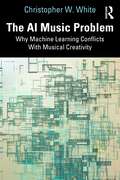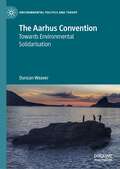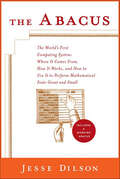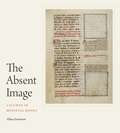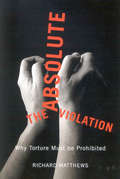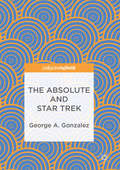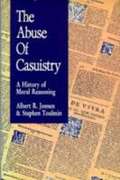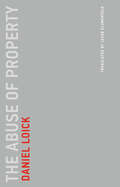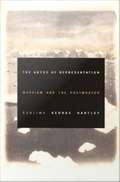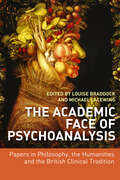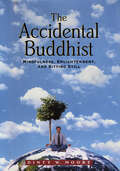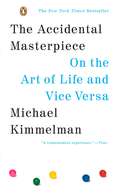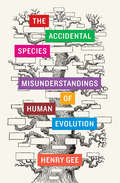- Table View
- List View
The 48 Laws Of Power
by Joost Elffers Robert GreeneCunning, instructive, and amoral, this controversial bestseller distills 3,000 years of the history of power into 48 well-explicated laws.
The 5 Skinny Habits: How Ancient Wisdom Can Help You Lose Weight and Change Your Life FOREVER
by David ZulbergIn his own personal weight-loss struggle, David Zulberg turned to the forgotten wisdom of the ancients—Maimonides, Aristotle, Hippocrates, Galen, and even Benjamin Franklin—to find consensus on ideal nutrition for optimum physical and emotional health. After 10 years of studying volume upon volume, Zulberg distilled the teachings of humanity's greatest doctors and philosophers—what he calls the Master Physicians—and discovered something amazing: Ancient doctors already knew what today's medical findings are rediscovering about what's best for human health, weight loss, disease prevention, and psychological well-being. On The 5 Skinny Habits diet plan, you'll harness the best of both worlds—the ancient and the modern—for long-term success.The 5 Skinny Habits explains the ancient understanding of health and its application to our lives in the 21st century with its supersize proportions. There are no forbidden foods or food groups, and you can even enjoy a glass of wine with dinner. Through a close study of ancient sources written by the Master Physicians, Zulberg integrates the spiritual, emotional, and physical components of health and weight loss. Habit changes are at the core of the program. With an easy five-step plan, Zulberg tells readers how to incorporate one habit each week for 5 weeks to achieve a healthier life. His five steps streamline and simplify the process of becoming fit, ensuring that change is made for good. A simple diet diary with positive affirmations and mindfulness makes self-monitoring an effective and enjoyable part of the discovery. By the end of the journey, readers have incorporated the habits into their routines so completely that they are no longer "dieting" but simply living a healthier life.
The 60-Second Philosopher: Expand your Mind on a Minute or So a Day!
by Andrew PessinPhilosophy means "love of knowledge" in Greek. Unfortunately, as much as we all love knowledge, we don't all have the time to spend acquiring it! This fabulous little book provides the perfect antidote. Split into 60 one-minute chapters, Andrew Pessin offers you a snippet of philosophical wisdom everyday, giving you something to think about on your coffee break. From time travel and morality, to happiness and freedom, Pessin is bound to entertain you with his razor-sharp wit. The perfect way to hone your mental faculties ,The Sixty-Second Philosopher will delight aspiring thinkers everywhere! Andrew Pessin is Chair of Philosophy at Conneticut College. He is the author of Gray Matters: An Introduction to the Philosophy of Mind and has appeared several times on the David Letterman show as "The Genius".
The 8 Laws of Change: How to Be an Agent of Personal and Social Transformation
by Stephan A. SchwartzScientifically based strategies for enacting successful and enduring change on personal, societal, and global levels, no matter what your background • 2016 Nautilus Silver Award • Shares the stories of people who have changed history, such as Martin Luther King Jr., Ben Franklin, and Gandhi, detailing how they used the 8 laws of change • Based on more than 16 years of scientific and historical research as well as the author’s own experiences during the Civil Rights movement • Explores research in the fields of medicine, neuroscience, biology, and quantum physics to reveal the science of how the 8 laws of change work Inspired by his own powerful experiences during the Civil Rights movement in the 1960s and other social movements in the ’70s, ’80s, and ’90s, Stephan Schwartz spent 16 years researching successful social transformations, uncovering the science and the patterns behind them all. He found that there are three ways to create social change. The first is the advancement of technology and science. The second--change compelled by physical power--is almost always coercive and violent and, for those reasons, not long lasting. The third avenue of change he discovered--the most successful and enduring--is one brought about by something so subtle it is often not taken seriously: small individual choices based on integrity and shared intention. Revealing how the dynamics of change are learnable, Schwartz explains the 8 laws of individual and social behavior that can enable any person or small group--even ordinary people without great wealth, official position, or physical power--to bend the arc of history and create successful lasting transformation. He shares the stories of individuals who have actually changed history, such as Martin Luther King Jr., Benjamin Franklin, Mother Teresa, and Mahatma Gandhi, detailing how they implemented the strategies and tactics of the 8 laws to achieve their success. The author explores research in the fields of medicine, neuroscience, biology, and quantum physics to reveal the science of how these laws of change work. He explains why compassionate and life-affirming changes have the most enduring impact and shows how each of the 8 laws cultivates a sense of “beingness” in the individual, empowering your integrity and connecting you to something greater than yourself--the key to lasting change on the personal, societal, and global levels.
The 80/20 Principle and 92 Other Powerful Laws of Nature
by Richard KochIn this follow-up to his best-selling The 80/20 Principle, the power law that helped hundreds of thousands achieve more by doing less, Richard Koch puts science to work, applying ninety-two other natural laws to promote the "science of success" within the ever-changing world of business. What does Charles Darwin's theory of natural selection prove about developing a niche product line? How can Isaac Newton's laws of motion and gravity help in a crowded marketplace? This is a must-have book for business leaders looking for clear, evidence-based reasoning that explains why some companies seem to find success everywhere they turn, while others don't make progress.
The A Priori Method in the Social Sciences: A Multidisciplinary Approach
by Jean-Sylvestre BergéThis edited volume takes a multidisciplinary look at the philosophical concept of a priori. Placing social sciences at the heart of the discussion, this book establishes a dialogue between various disciplines and the different postulates, presuppositions, prejudices, paradigms, beliefs, commonplaces, biases or emotions that forge their theoretical and practical constructs. The book is divided into three parts. Chapters in Part I lay the foundations of a new antecedent approach that revisits the classical approach to a priori and its relationships with law and philosophy. Chapters in Part II extend the analysis to economics and management, on such key topics as blockchain technology, labor, health insurance and innovation. Finally, chapters in Part III turn to anthropology and sociology, to reconsider the core methods of these different disciplines and to nourish reflection on the basis of new working hypotheses.
The A Priori Without Magic (Elements in Epistemology)
by Jared WarrenThe distinction between the a priori and the a posteriori is an old and influential one. But both the distinction itself and the crucial notion of a priori knowledge face powerful philosophical challenges. Many philosophers worry that accepting the a priori is tantamount to accepting epistemic magic. In contrast, this Element argues that the a priori can be formulated clearly, made respectable, and used to do important epistemological work. The author's conception of the a priori and its role falls short of what some historical proponents of the notion may have hoped for, but it allows us to accept and use the notion without abandoning either naturalism or empiricism, broadly understood. This Element argues that we can accept and use the a priori without magic.
The ABC of Relativity (Routledge Classics Ser.)
by Bertrand RussellThe Nobel Prize winner offers &“an ideal introduction to the theories of special and general relativity&” in clear, comprehensible language(Nature). A renowned mathematician and philosopher, and as well as recipient of the Nobel Prize in Literature, Bertrand Russell was acclaimed for his ability to address complex subjects in accessible ways. In this classic reference book, Russell delves into physics and relativity, helping everyday readers grasp the genius and implications of Albert Einstein&’s theory. When originally published in 1925, The ABC of Relativity brought science to a more general audience—and it continues to do so in the twenty-first century. &“A mind of dazzling brilliance.&” —The New York Times
The ABCs of Human Survival
by Arthur ClarkThe ABCs of Human Survival examines the effect of militant nationalism and the lawlessness of powerful states on the well-being of individuals and local communities?and the essential role of global citizenship within that dynamic. Based on the analysis of world events, Dr. Arthur Clark presents militant nationalism as a pathological pattern of thinking that threatens our security, while emphasizing effective democracy and international law as indispensable frameworks for human protection. Within the contexts of history, sociology, philosophy, and spirituality, The ABCs of Human Survival calls into question the assumptions of consumer culture and offers, as an alternative, strategies to improve overall well-being through the important choices we make as individuals.
The ABC’s of Science
by Giuseppe MussardoScience, with its inherent tension between the known and the unknown, is an inexhaustible mine of great stories. Collected here are twenty-six among the most enchanting tales, one for each letter of the alphabet: the main characters are scientists of the highest caliber most of whom, however, are unknown to the general public.This book goes from A to Z. The letter A stands for Abel, the great Norwegian mathematician, here involved in an elliptic thriller about a fundamental theorem of mathematics, while the letter Z refers to Absolute Zero, the ultimate and lowest temperature limit, - 273,15 degrees Celsius, a value that is tremendously cooler than the most remote corner of the Universe: the race to reach this final outpost of coldness is not yet complete, but, similarly to the history books of polar explorations at the beginning of the 20th century, its pages record successes, failures, fierce rivalries and tragic desperations. In between the A and the Z, the other letters of the alphabet are similar to the various stages of a very fascinating journey along the paths of science, a journey in the company of a very unique set of characters as eccentric and peculiar as those in Ulysses by James Joyce: the French astronomer who lost everything, even his mind, to chase the transits of Venus; the caustic Austrian scientist who, perfectly at ease with both the laws of psychoanalysis and quantum mechanics, revealed the hidden secrets of dreams and the periodic table of chemical elements; the young Indian astrophysicist who was the first to understand how a star dies, suffering the ferocious opposition of his mentor for this discovery. Or the Hungarian physicist who struggled with his melancholy in the shadows of the desert of Los Alamos; or the French scholar who was forced to hide her femininity behind a false identity so as to publish fundamental theorems on prime numbers. And so on and so forth.Twenty-six stories, which reveal the most authentic atmosphere of science and the lives of some of its main players: each story can be read in quite a short period of time -- basically the time it takes to get on and off the train between two metro stations. Largely independent from one another, these twenty-six stories make the book a harmonious polyphony of several voices: the reader can invent his/her own very personal order for the chapters simply by ordering the sequence of letters differently. For an elementary law of Mathematics, this can give rise to an astronomically large number of possible books -- all the same, but - then again - all different. This book is therefore the ideal companion for an infinite number of real or metaphoric journeys.
The AI Does Not Hate You: Superintelligence, Rationality and the Race to Save the World
by Tom Chivers'A fascinating and delightfully written book about some very smart people who may not, or may, be about to transform humanity forever' JON RONSONThis is a book about AI and AI risk. But it's also more importantly about a community of people who are trying to think rationally about intelligence, and the places that these thoughts are taking them, and what insight they can and can't give us about the future of the human race over the next few years. It explains why these people are worried, why they might be right, and why they might be wrong. It is a book about the cutting edge of our thinking on intelligence and rationality right now by the people who stay up all night worrying about it.Along the way, we discover why we probably don't need to worry about a future AI resurrecting a perfect copy of our minds and torturing us for not inventing it sooner, but we perhaps should be concerned about paperclips destroying life as we know it; how Mickey Mouse can teach us an important lesson about how to program AI; and how a more rational approach to life could be what saves us all.
The AI Music Problem: Why Machine Learning Conflicts With Musical Creativity
by Christopher W. WhiteMusic poses unique and complex challenges for artificial intelligence, even as 21st-century AI grows ever more adept at generating compelling content. The AI Music Problem: Why Machine Learning Conflicts With Musical Creativity probes the challenges behind AI-generated music, with an investigation that straddles the technical, the musical, and the aesthetic. Bringing together the perspectives of the humanities and computer science, the author shows how the difficulties that music poses for AI connect to larger questions about music, artistic expression, and the increasing ubiquity of artificial intelligence. Taking a wide view of the current landscape of machine learning and Large Language Models, The AI Music Problem offers a resource for students, researchers, and the public to understand the broader issues surrounding musical AI on both technical and artistic levels. The author breaks down music theory and computer science concepts with clear and accessible explanations, synthesizing the technical with more holistic and human-centric analyses. Enabling readers of all backgrounds to understand how contemporary AI models work and why music is often a mismatch for those processes, this book is relevant to all those engaging with the intersection between AI and musical creativity today.
The Aarhus Convention: Towards Environmental Solidarisation (Environmental Politics and Theory)
by Duncan WeaverThe Aarhus Convention on access to information, public participation in decision-making and access to justice in environmental matters has been celebrated as a pioneering international environmental agreement. Given that a quarter-century has passed since Aarhus was opened for signature, now is an opportune moment to revisit it from a fresh perspective. Marking this anniversary, this book explores Aarhus from the vista of the English School of International Relations, an ethically-minded perspective used to gauge the prevalence of state-oriented and human-oriented progress from the Convention's rationales and realities. It firstly considers Aarhus' propagation, investigating the legal, diplomatic and geopolitical contexts enabling its emergence. It secondly investigates Aarhus' germination, with reference to its trinity of procedural rights. Thirdly, the book examines the Convention's growth, in terms of the development of its organisational infrastructure. The chief finding is that Aarhus demonstrates, in environmental contexts, the feasibility and benefit of fostering 'humankind' solidarist progress, rooted in moral cosmopolitanism, within the existing power arrangements of a sovereignty-based pluralism. Pluralist concerns for diversity and international order are found to be a precondition for more ethically ambitious solidarist endeavours. These observations reinforce the logic of solidarisation, an English School innovation that presents sovereignty as (a) being ethically matured by solidarism whilst (b) delimiting solidarism within the threshold of states' tolerance.
The Abacus: The World's First Computing System
by Jesse DilsonThe abacus is as useful and effecient a machine today as it was when it was first created centures ago. Whether you're an expert in the latest computer technology or you're mastering arithmetic and word problems for the first time, it won't take long to learn the basics (and even the not-so-basics) of adding, subtracting, multiplying, and dividing on this ingenious and fun-to-use mathematical tool.
The Absent Image: Lacunae in Medieval Books
by Elina GertsmanGuided by Aristotelian theories, medieval philosophers believed that nature abhors a vacuum. Medieval art, according to modern scholars, abhors the same. The notion of horror vacui—the fear of empty space—is thus often construed as a definitive feature of Gothic material culture. In The Absent Image, Elina Gertsman argues that Gothic art, in its attempts to grapple with the unrepresentability of the invisible, actively engages emptiness, voids, gaps, holes, and erasures.Exploring complex conversations among medieval philosophy, physics, mathematics, piety, and image-making, Gertsman considers the concept of nothingness in concert with the imaginary, revealing profoundly inventive approaches to emptiness in late medieval visual culture, from ingenious images of the world’s creation ex nihilo to figurations of absence as a replacement for the invisible forces of conception and death.Innovative and challenging, this book will find its primary audience with students and scholars of art, religion, physics, philosophy, and mathematics. It will be particularly welcomed by those interested in phenomenological and cross-disciplinary approaches to the visual culture of the later Middle Ages.
The Absent Image: Lacunae in Medieval Books
by Elina GertsmanWinner of the 2022 Charles Rufus Morey Award from the College Art AssociationGuided by Aristotelian theories, medieval philosophers believed that nature abhors a vacuum. Medieval art, according to modern scholars, abhors the same. The notion of horror vacui—the fear of empty space—is thus often construed as a definitive feature of Gothic material culture. In The Absent Image, Elina Gertsman argues that Gothic art, in its attempts to grapple with the unrepresentability of the invisible, actively engages emptiness, voids, gaps, holes, and erasures.Exploring complex conversations among medieval philosophy, physics, mathematics, piety, and image-making, Gertsman considers the concept of nothingness in concert with the imaginary, revealing profoundly inventive approaches to emptiness in late medieval visual culture, from ingenious images of the world’s creation ex nihilo to figurations of absence as a replacement for the invisible forces of conception and death.Innovative and challenging, this book will find its primary audience with students and scholars of art, religion, physics, philosophy, and mathematics. It will be particularly welcomed by those interested in phenomenological and cross-disciplinary approaches to the visual culture of the later Middle Ages.
The Absolute Violation: Why Torture Must Be Prohibited
by Richard S. MatthewsRichard Matthews challenges the increasing acceptability of state-sponsored torture interrogation, repudiating any possible justifications. He confronts its various supporters - ticking time bomb and tragic choice theorists, utilitarians, legal scholars - and draws from philosophy, medicine, psychiatry, survivor and torturer narratives, history, feminism, the experience of working intelligence officials, anthropology, and game theory to illustrate that no moral justification for torture can be supported.
The Absolute and Star Trek
by George A. GonzalezThis volume explains how Star Trek allows viewers to comprehend significant aspects of Georg Hegel's concept the absolute, the driving force behind history. Gonzalez, with wit and wisdom, explains how Star Trek exhibits central elements of the absolute. He describes how themes and ethos central to the show display the concept beautifully. For instance, the show posits that people must possess the correct attitudes in order to bring about an ideal society: a commitment to social justice; an unyielding commitment to the truth; and a similar commitment to scientific, intellectual discovery. These characteristics serve as perfect embodiments of Hegel's conceptualization, and Gonzalez's analysis is sharp and exacting.
The Abuse of Casuistry: A History of Moral Reasoning
by Albert R. Jonsen Stephen E. ToulminIn this engaging study, the authors put casuistry into its historical context, tracing the origin of moral reasoning in antiquity, its peak during the sixteenth and early seventeenth century, and its subsequent fall into disrepute from the mid-seventeenth century.
The Abuse of Property (Untimely Meditations #19)
by Daniel LoickA fundamental critique of the current property regime, calling for radical social and political change.In The Abuse of Property, Daniel Loick offers a multifaceted philosophical critique of the concept of property, broadly understood. He argues that property should not be the dominant framework in which human beings regulate the use of things, that property is not the same as use. Property rights, in his view, are not conditions of freedom or justice, but deficient, dysfunctional, and harmful ways of interacting with other people and the natural environment. He dissects not only the classic justifications of property (from John Locke's justification of property as a natural right based on individual freedom to Hegel's justification of property as a form of mutual recognition) but also the classic critiques of property, from Proudhon and Marx up to Adorno and Agamben.Through an innovative critical approach to legal studies, Loick demonstrates how the concept of property, historically applied to things and people and still a linchpin of our distorted relation with the world, forms a direct line from the Occupy movement to Black Lives Matter and beyond.
The Abyss of Representation: Marxism and the Postmodern Sublime
by George HartleyFrom the Copernican revolution of Immanuel Kant to the cognitive mapping of Fredric Jameson to the postcolonial politics of Gayatri Chakravorty Spivak, representation has been posed as both indispensable and impossible. In his pathbreaking work, The Abyss of Representation, George Hartley traces the development of this impossible necessity from its German Idealist roots through Marxist theories of postmodernism, arguing that in this period of skepticism and globalization we are still grappling with issues brought forth during the age of romanticism and revolution. Hartley shows how the modern problem of representation--the inability of a figure to do justice to its object--still haunts today's postmodern philosophy and politics. He reveals the ways the sublime abyss that opened up in Idealist epistemology and aesthetics resurfaces in recent theories of ideology and subjectivity. Hartley describes how modern theory from Kant through Lacan attempts to come to terms with the sublime limits of representation and how ideas developed with the Marxist tradition--such as Marx's theory of value, Althusser's theory of structural causality, or Zizek's theory of ideological enjoyment--can be seen as variants of the sublime object. Representation, he argues, is ultimately a political problem. Whether that problem be a Marxist representation of global capitalism, a deconstructive representation of subaltern women, or a Chicano self-representation opposing Anglo-American images of Mexican Americans, it is only through this grappling with the negative, Hartley explains, that a Marxist theory of postmodernism can begin to address the challenges of global capitalism and resurgent imperialism.
The Academic Face of Psychoanalysis: Papers in Philosophy, the Humanities, and the British Clinical Tradition
by Michael Lacewing Louise BraddockEver since Freud, psychoanalysts have explored the connections between psychoanalysis and literature and psychoanalysis and philosophy, while literary criticism, social science and philosophy have all reflected on and made use of ideas from psychoanalytic theory. The Academic Face of Psychoanalysis presents contributions from these fields and gives the reader an insight into different understandings and applications of psychoanalytic theory. This book comprises twelve contributions from experts in their fields covering philosophy, psychoanalysis, sociology and literary theory. The chapters are divided into three distinct sections: Psychoanalysis Philosophy Social science and literary theory Louise Braddock and Michael Lacewing successfully bring these contributions together with an in-depth introduction that allows the reader to explore the connections between the different disciplines. The multi-disciplinary approach to this book is rare; it will appeal to academics and students, from the subject areas of psychoanalysis, humanities and social science.
The Accidental Buddhist: Mindfulness, Enlightenment, and Sitting Still
by Dinty W. MooreA journey through the diverse landscape of American Buddhism, written with “a blessedly down-to-earth sense of humor” (Rodger Kamenetz, author of The Jew in the Lotus). In an era when many of us yearn for an escape from a culture of noise and narcissism, this book takes us into the physical and spiritual geography of Buddhism, American-style: from a weekend at a mountain retreat for corporate executives learning effective ways to cope with stress, to a visit with a Zen teacher holding classes in an old Quaker farmhouse, to a meeting with a Catholic priest who’s also a Zen master. Both a lively introduction to this Eastern spiritual tradition and a colorful portrait of American society, The Accidental Buddhist “makes the oftentimes impenetrable concepts of Buddhism accessible to the reader and contains striking, and important, parallels and contrasts between [the author’s] own Catholic upbringing and ancient Buddhist traditions” (Library Journal). “A travelogue detailing the tremendous diversity within American Buddhism. His anecdotes make it clear that the umbrella term ‘Buddhist’ encompasses strict Zen monks, laid-back Tibetan politicos, and beatnik holdover Allen Ginsberg. In his travels, Moore attends weekend retreats, chronicles the Dalai Lama’s 1996 visit to Indiana, and grooves to Change Your Mind Day, a meditative Buddha-fest in New York City’s Central Park. . . . He finds that his family is his sangha (monastery), and while he still feels he is ‘probably a fairly lousy Buddhist,’ he will eclectically combine his various forms of new knowledge to find a path that makes sense to him. Now that may be an authentic American Buddhism.” —Kirkus Reviews
The Accidental Masterpiece: On the Art of Life and Vice Versa
by Michael KimmelmanA New York Times bestseller—a dazzling and inspirational survey of how art can be found and appreciated in everyday lifeMichael Kimmelman, the prominent New York Times writer and a regular contributor to The New York Review of Books, is known as a deep and graceful writer across the disciplines of art and music and also as a pianist who understands something about the artist's sensibility from the inside. Readers have come to expect him not only to fill in their knowledge about art but also to inspire them to think about connections between art and the larger world - which is to say, to think more like an artist. Kimmelman's many years of contemplating and writing about art have brought him to this wise, wide-ranging, and long-awaited book.It explores art as life's great passion, revealing what we can learn of life through pictures and sculptures and the people who make them. It assures us that art - points of contact with the exceptional that are linked straight to the heart - can be found almost anywhere and everywhere if only our eyes are opened enough to recognize it. Kimmelman regards art, like all serious human endeavors, as a passage through which a larger view of life may come more clearly into focus. His book is a kind of adventure or journey.It carries the message that many of us may not yet have learned how to recognize the art in our own lives. To do so is something of an art itself. A few of the characters Kimmelman describes, like Bonnard and Chardin, are great artists. But others are explorers and obscure obsessives, paint-by-numbers enthusiasts, amateur shutterbugs, and collectors of strange odds and ends. Yet others, like Charlotte Solomon, a girl whom no one considered much of an artist but who secretly created a masterpiece about the world before her death in Auschwitz, have reserved spots for themselves in history, or not, with a single work that encapsulates a whole life.Kimmelman reminds us of the Wunderkammer, the cabinet of wonders - the rage in seventeenth-century Europe and a metaphor for the art of life. Each drawer of the cabinet promises something curious and exotic, instructive and beautiful, the cabinet being a kind of ideal, self-contained universe that makes order out of the chaos of the world. The Accidental Masterpiece is a kind of literary Wunderkammer, filled with lively surprises and philosophical musings. It will inspire readers to imagine their own personal cabinet of wonders.
The Accidental Species: Misunderstandings of Human Evolution
by Henry GeeThe idea of a missing link between humanity and our animal ancestors predates evolution and popular science and actually has religious roots in the deist concept of the Great Chain of Being. Yet, the metaphor has lodged itself in the contemporary imagination, and new fossil discoveries are often hailed in headlines as revealing the elusive transitional step, the moment when we stopped being “animal” and started being “human. ” In The Accidental Species, Henry Gee, longtime paleontology editor at Nature, takes aim at this misleading notion, arguing that it reflects a profound misunderstanding of how evolution works and, when applied to the evolution of our own species, supports mistaken ideas about our own place in the universe. Gee presents a robust and stark challenge to our tendency to see ourselves as the acme of creation. Far from being a quirk of religious fundamentalism, human exceptionalism, Gee argues, is an error that also infects scientific thought. Touring the many features of human beings that have recurrently been used to distinguish us from the rest of the animal world, Gee shows that our evolutionary outcome is one possibility among many, one that owes more to chance than to an organized progression to supremacy. He starts with bipedality, which he shows could have arisen entirely by accident, as a by-product of sexual selection, moves on to technology, large brain size, intelligence, language, and, finally, sentience. He reveals each of these attributes to be alive and well throughout the animal world—they are not, indeed, unique to our species. The Accidental Species combines Gee’s firsthand experience on the editorial side of many incredible paleontological findings with healthy skepticism and humor to create a book that aims to overturn popular thinking on human evolution—the key is not what’s missing, but how we’re linked.
